Natural law in Roman jurisprudence refers to a system of justice deemed common to all humans, rooted in nature rather than societal rules. This concept signifies a moral foundation that transcends human-made laws, emphasizing inherent justice and ethical principles guiding legal systems.
The Romans referred to this as ius naturale, a key element in shaping human rights. This foundational role highlights how natural law imposed universally valid moral requirements, influencing both conscience and written law.
As we delve into the historical roots of natural law in Roman society, we will uncover its profound impact on modern human rights doctrines and the enduring legacy of Roman legal thought.
Roman Society and Legal Framework
Roman society was a complex tapestry of social hierarchies and political structures that underscored the need for a robust legal system. At its core, Rome was a civilization driven by law and order, where legal principles were essential to maintaining societal cohesion and stability. The legal system in Rome was a reflection of its social norms and values, deeply intertwined with the concept of natural law.

The role of law in Roman culture was paramount; it was not merely a tool for governance but a guiding force that upheld justice and ethical standards. Roman laws helped regulate interactions among citizens, ensuring that societal order was preserved through clearly defined rights and responsibilities. This legal framework laid the groundwork for concepts of justice that continue to influence modern legal systems.
Cicero’s Influence on Natural Law
Cicero’s contributions to the concept of natural law are both profound and enduring. He defined natural law as “right reason in harmony with nature,” asserting that true law is universal, unchanging, and eternal. This notion laid the foundation for modern theories of natural rights, emphasizing that laws must align with a moral order inherent to the universe. Cicero posited that justice is the ultimate goal of humanity, a virtue essential for societal harmony. Without justice, no law could be legitimate, which influenced later thoughts on human dignity and rights.
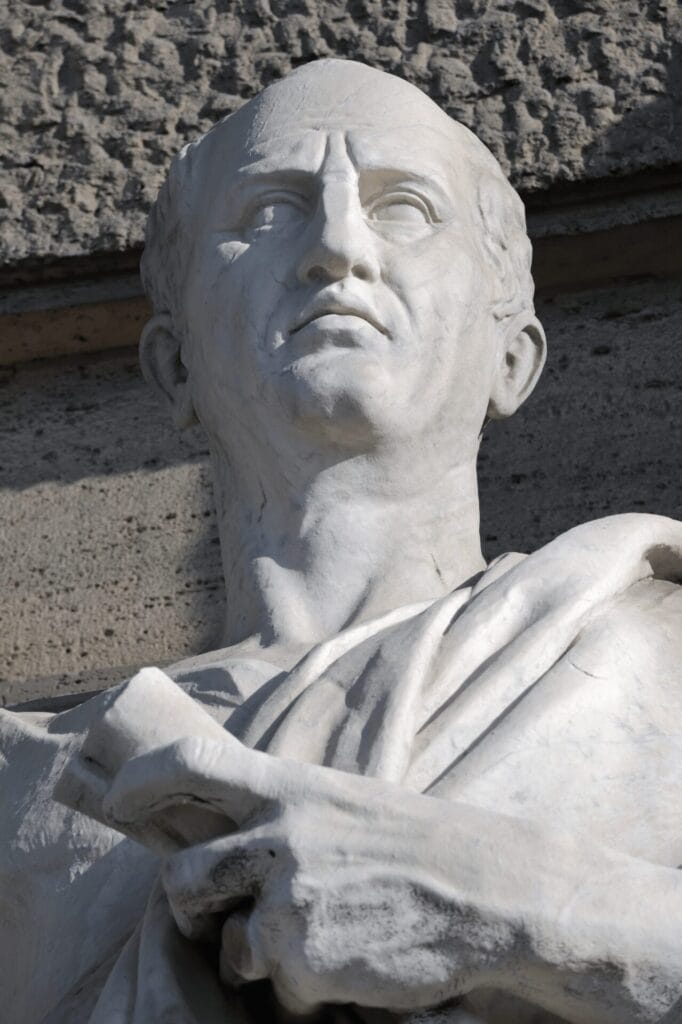
“True law is right reason in agreement with nature; it is of universal application, unchanging and everlasting.” – Cicero
Moreover, Cicero’s belief in a common human moral framework resonates with modern human rights concepts. He viewed reason as a divine gift, highlighting the intrinsic dignity of every person. Cicero insisted that civil laws must conform to natural law, arguing that laws misaligned with nature cannot be true laws. This perspective helped shape the legal theories prioritizing natural rights over positive law, continuing to influence the development of human rights principles today.
The Philosophical Underpinnings
The philosophical roots of natural law in Roman thought are deeply intertwined with Greek philosophy. The Romans, notably through thinkers like Cicero, adapted Greek ideas to form a comprehensive framework of natural law. This synthesis was significantly influenced by Stoicism, which emphasized a universal reason or logos governing the cosmos. Roman philosophers integrated these Stoic principles into their legal and moral systems, facilitating a structured understanding of justice and human rights.
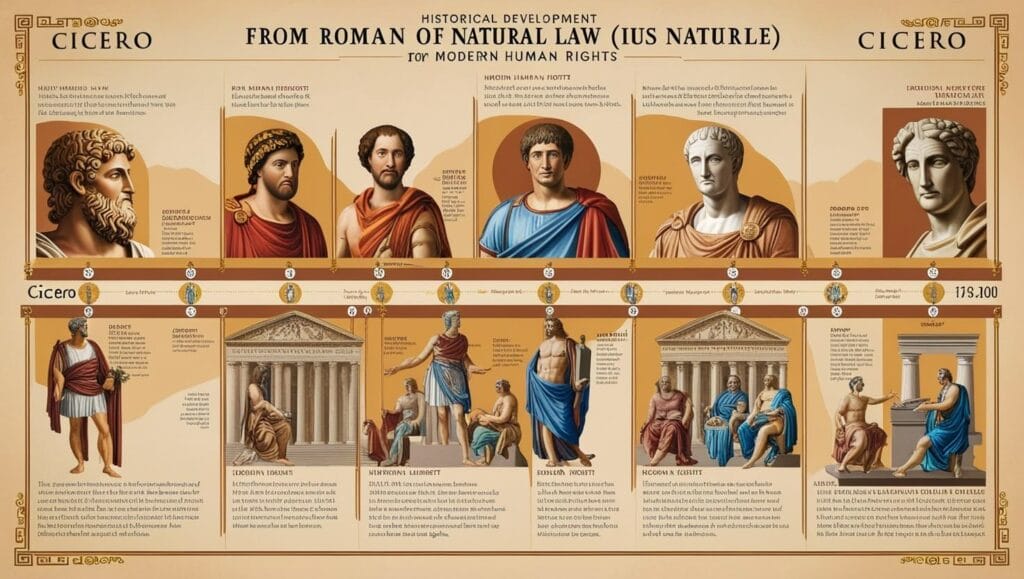
Greek philosophical concepts, particularly from Plato and Aristotle, also played a crucial role. These ideas on virtue and the good life helped shape the Roman view of law as a tool for achieving societal harmony. The Romans adapted these Greek notions to form a legal system that emphasized morality and universal truths, thus bridging the gap between philosophical ideals and governance.
| Philosophical Influence | Greek Concept | Roman Adaptation |
|---|---|---|
| Stoicism | Universal reason (logos) | Natural law in legal systems |
| Plato & Aristotle | Virtue and the good life | Law as a means for societal harmony |
This philosophical integration laid a robust foundation for natural law, influencing Western legal traditions, and ensuring that laws align with moral and universal principles.
Roman Legal Codification
The process of legal codification in Rome was pivotal in shaping a comprehensive legal system that laid the groundwork for modern human rights. The most significant development in this regard was the establishment of the Twelve Tables in the mid-5th century BC. These tables served as the first attempt to create a public and accessible code of law, ensuring that citizens had a clear understanding of their rights and responsibilities.
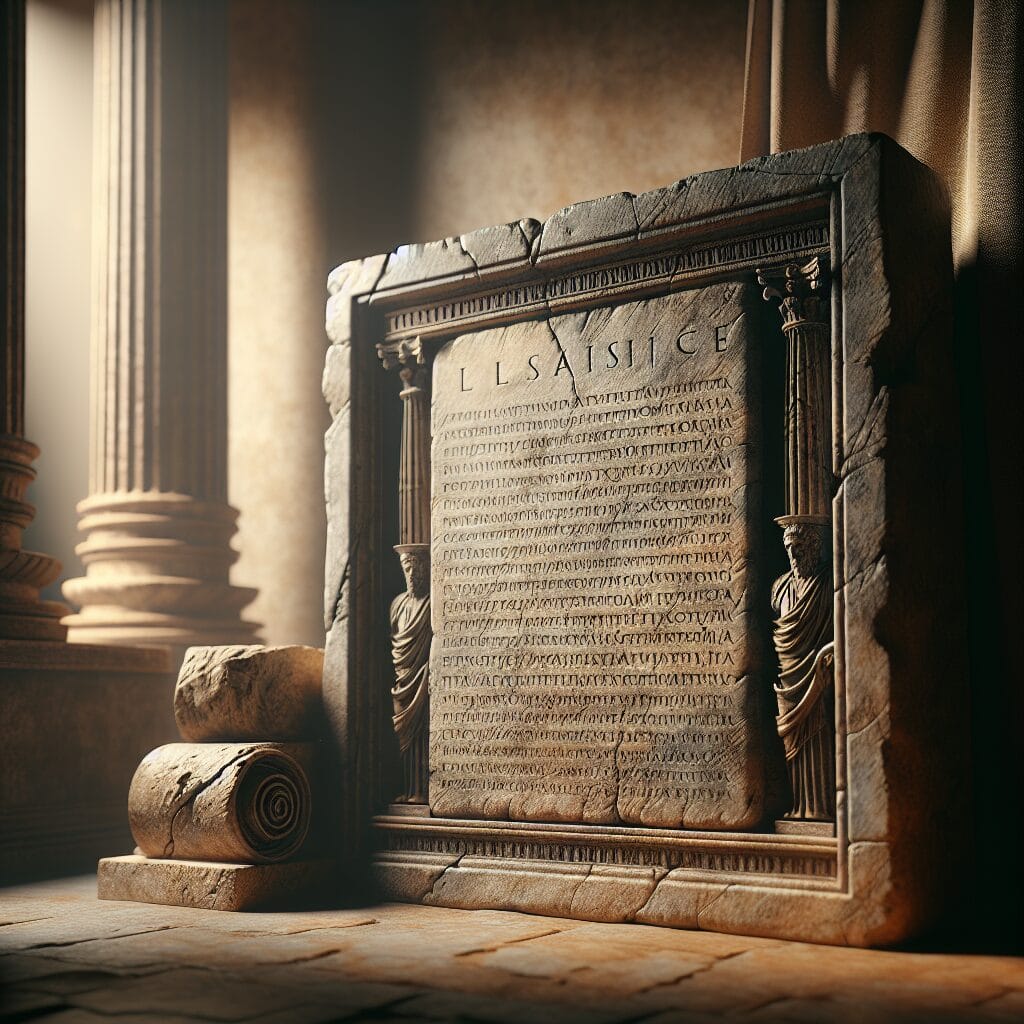
The Twelve Tables encompassed key principles, such as:
- Equality before the law
- Protection of property rights
- Procedures for legal redress
- Provisions against abuse of power
By codifying these laws, Rome set a precedent for future legal systems, emphasizing the importance of transparency and fairness in governance. This codification not only reinforced societal order but also established a foundation upon which the principles of natural law could further evolve.
Applications of Natural Law
In Roman society, the application of natural law was evident in various aspects of legal and civic life. Natural law, as articulated by Cicero and his contemporaries, served as a guiding principle for establishing just laws and governance. This principle was reflected in the Roman emphasis on equality before the law and the protection of individual rights.
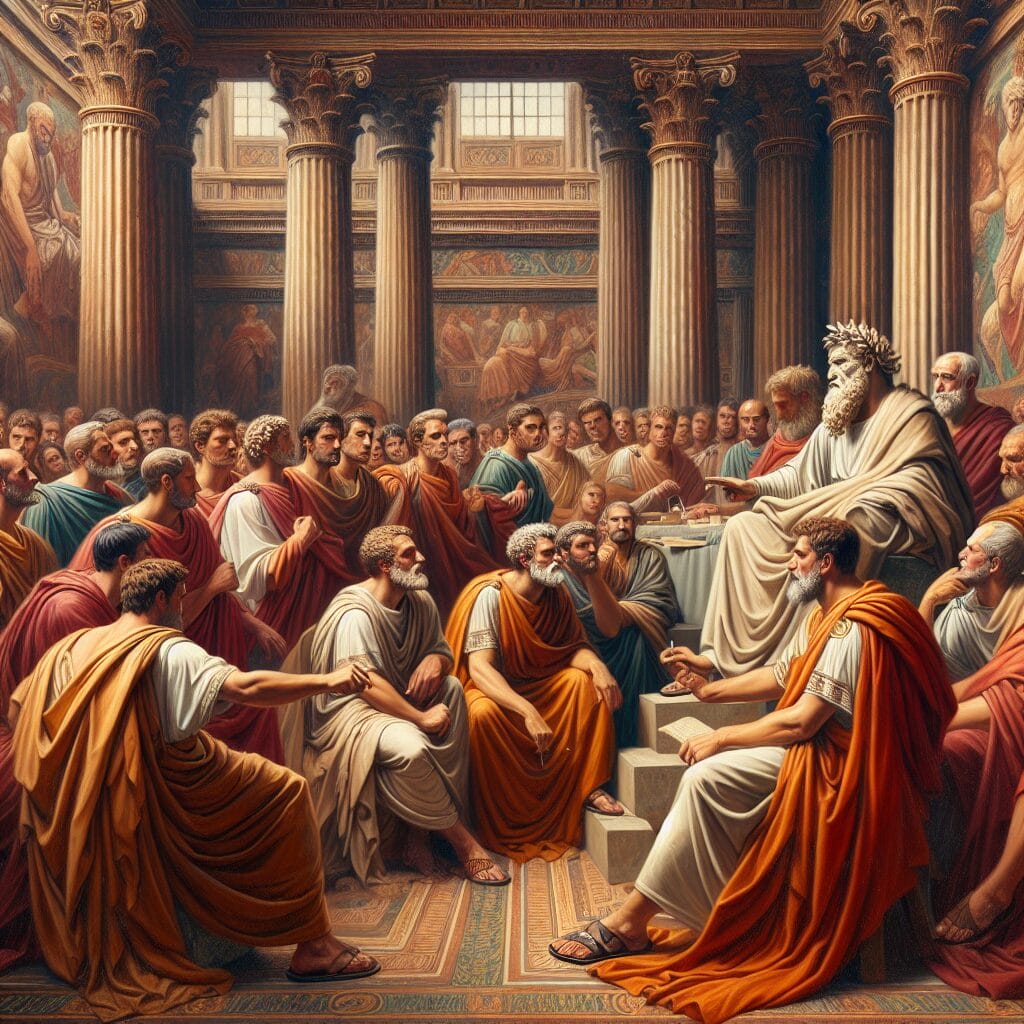
One significant example of natural law in action was the Roman legal framework’s recognition of universal moral truths, which were derived from Greek philosophical thought. This led to the formulation of laws that emphasized justice, such as the protection of property rights and the enforcement of contracts. Roman laws often sought to align with the moral principles of natural law, ensuring that they were not only legally binding but also morally just.
The impact of natural law applications in Roman society was profound. By prioritizing justice and moral integrity, these applications fostered social harmony and stability. The Roman legal system’s alignment with natural law principles also laid the groundwork for modern human rights, influencing the development of legal doctrines that continue to resonate in contemporary legal systems worldwide.
Natural Law and Roman Citizenship
The concept of natural law was pivotal in shaping the rights and responsibilities of Roman citizens. Cicero’s articulation of natural law emphasized a universal, eternal law derived from divine reason, which profoundly influenced Roman legal structures. This framework underpinned the rights accorded to Roman citizens, ensuring that laws aligned with moral and ethical
principles.

Under Roman law, citizenship conferred several rights and responsibilities, rooted in natural law:
- Protection of property rights, which Cicero argued were essential for societal stability.
- Right to a fair trial, reflecting the principle of justice as a universal truth.
- Duty to uphold civic responsibilities, such as participating in governance and military service.
- Obligation to adhere to laws that reflect natural law, ensuring societal harmony.
These elements of citizenship not only fostered a sense of community but also laid the groundwork for modern human rights doctrines, which continue to draw on the principles of natural law in their foundations.
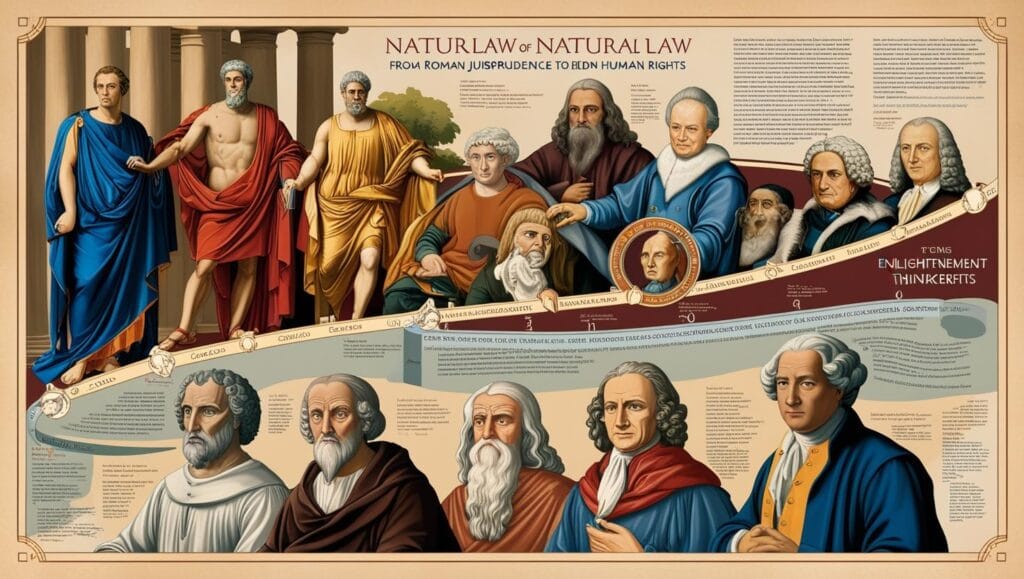
Transition to Modern Human Rights
The enduring influence of Roman natural law on contemporary human rights is profound and multifaceted. At its core, Roman natural law established the principle that rights are inherent to all human beings, independent of state recognition. This foundational concept is echoed in modern human rights doctrines, which emphasize the universality of human rights.

The idea that rights preexist governmental structures is enshrined in many modern constitutions. For instance, the United States Declaration of Independence famously asserts, “We hold these truths to be self-evident, that all men are created equal, that they are endowed by their Creator with certain unalienable Rights.” This statement reflects the Roman natural law principle that rights are not granted by the state but are inherent to human nature.
Furthermore, modern human rights frameworks continue to draw on the Roman notion of the correlation between rights and duties. Contemporary legal systems often stress the responsibilities individuals have towards their communities, a concept deeply rooted in the societal values of ancient Rome. This alignment underscores the lasting impact of Roman legal thought on today’s global human rights landscape.
Enlightenment Thinkers and Natural Law
The Enlightenment period was crucial in the development of natural law and human rights, continuing the legacy of Roman legal principles. Enlightenment philosophers built upon the concept of inherent, inalienable rights that are not bestowed by governments but are intrinsic to human existence.

Key figures in this era drew from Roman ideas, emphasizing justice and morality as universal principles. Notably, John Locke advocated for the protection of natural rights, such as property, and believed in the right to overthrow governments that fail their citizens. Thomas Hobbes, although more authoritarian, also engaged with Roman concepts in his discussions on governance.
| Philosopher | Contribution |
|---|---|
| John Locke | Protection of property rights, right to revolution |
| Thomas Hobbes | Advocacy for strong government to protect rights |
| Montesquieu | Separation of powers, importance of liberty and justice |
| Jean-Jacques Rousseau | Equality in natural state, protection of rights in society |
| Thomas Paine | Integration of civil and natural rights |
These thinkers laid the groundwork for modern human rights, drawing heavily on the enduring influence of Roman natural law principles.
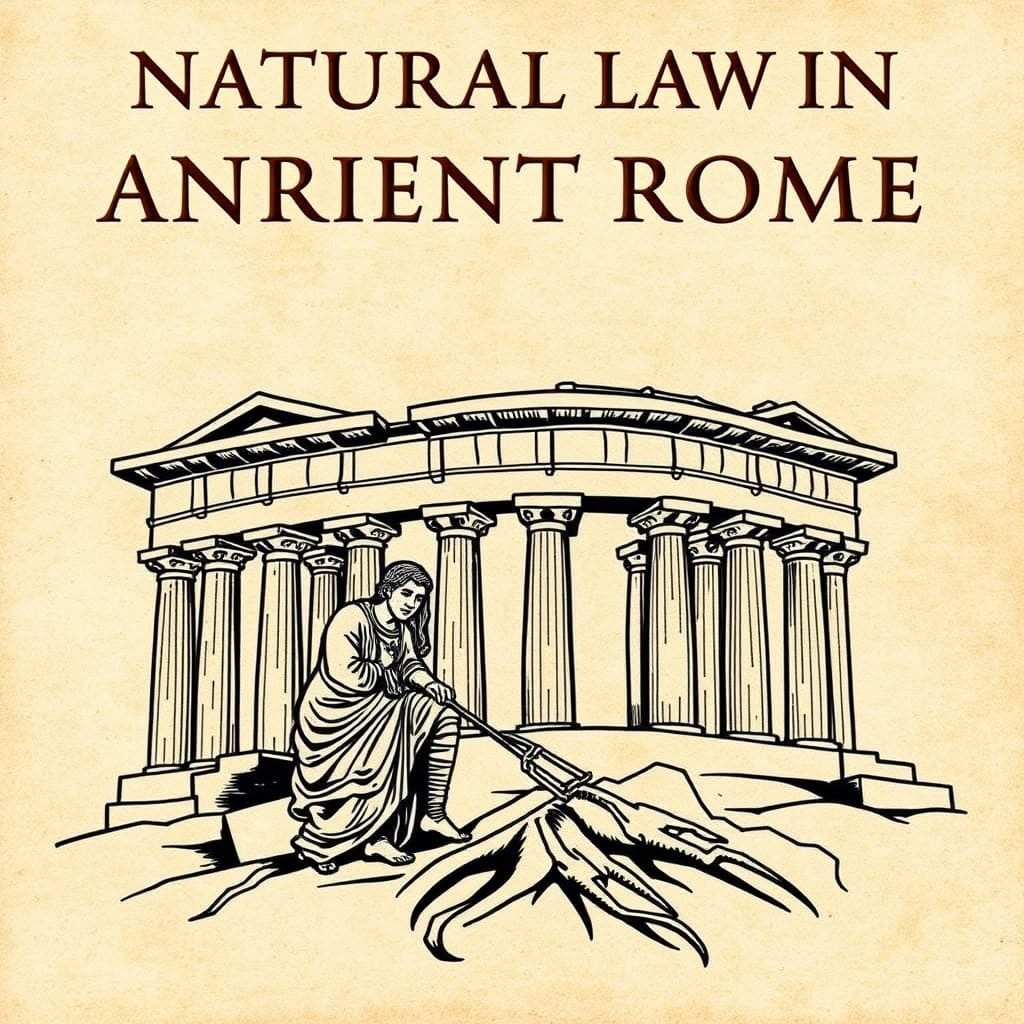
Case Study: The French Revolution
The French Revolution (1789-1799) marked a profound transformation in France, characterized by the overthrow of the monarchy and the establishment of a republic. The revolution sought to abolish the entrenched social and political inequalities of the Ancien Régime and was deeply influenced by the principles of natural law. This period was pivotal in the evolution of human rights as it embraced the Enlightenment ideals of liberty, equality, and fraternity.
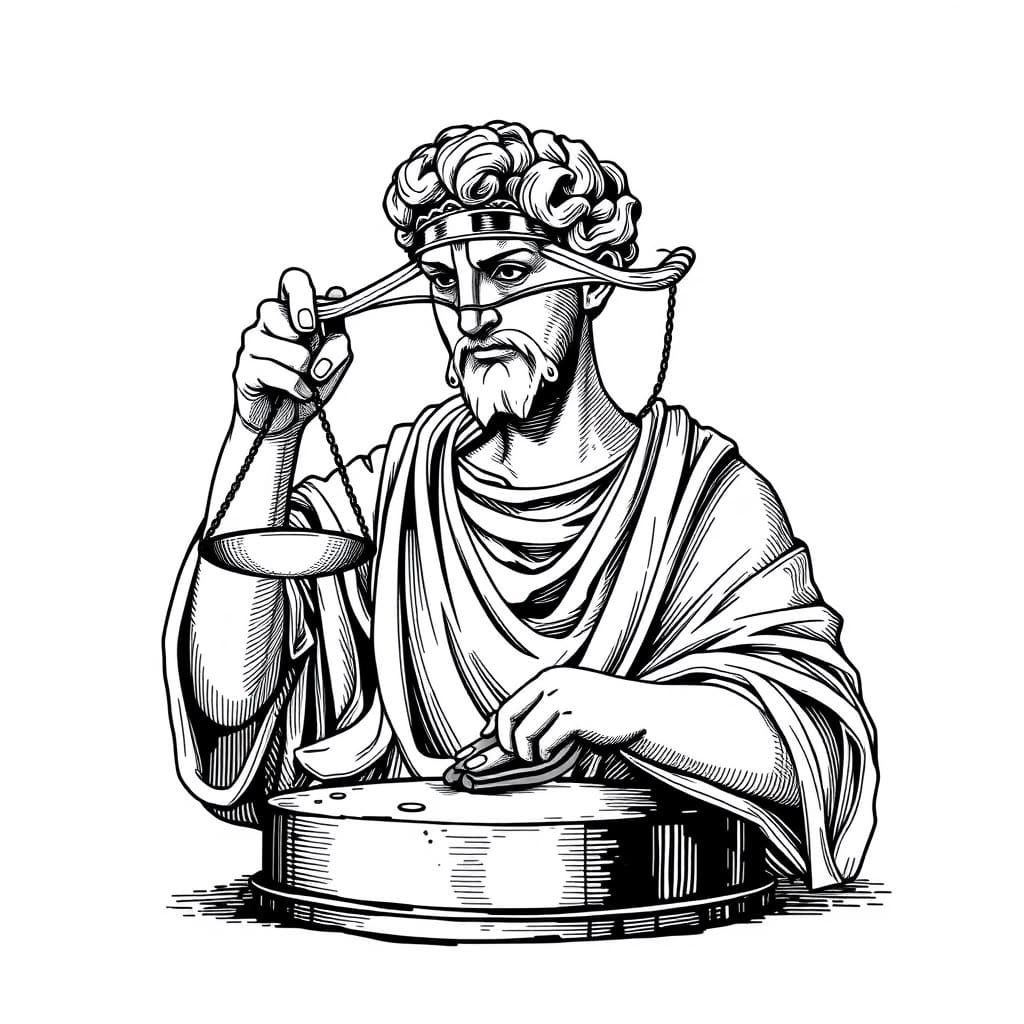
Key revolutionary documents, such as the Declaration of the Rights of Man and of the Citizen, drew heavily on natural law concepts. These documents enshrined principles like the equality of all men and the inherent rights to liberty and justice. Such ideals were reminiscent of Roman natural law, which emphasized universal justice and morality.
By incorporating Roman principles, the French Revolution not only challenged existing power structures but also laid the groundwork for modern democratic systems. The legacy of these ideas is evident in their enduring influence on contemporary human rights frameworks globally.
Natural Law in American Constitution
The incorporation of natural law into the U.S. Constitution reflects a melding of Enlightenment ideals and Roman legal traditions. Foundational thinkers such as John Locke and Thomas Hobbes greatly influenced the Founding Fathers, embedding the concept of inherent rights within the Constitution. These rights, described in the Declaration of Independence as “unalienable Rights” to “Life, Liberty and the pursuit of Happiness,” are grounded in natural law principles.

The Constitution’s framework, particularly the Bill of Rights, showcases this influence by safeguarding individual liberties against governmental infringement. Amendments such as the First and Fourth reflect these protective measures, aligning with the notion of universal moral standards. “We the People,” the opening phrase of the Constitution, underscores its moral foundation.
Additionally, Roman law has left an indelible mark on U.S. legal thought. The jurisprudential process, enriched by Roman concepts, has helped shape American judicial interpretation, ensuring that laws remain just and equitable. This blend of Roman and Enlightenment ideas underscores the Constitution’s role as both a legal and moral beacon.
Contemporary Human Rights Framework
The evolution of modern human rights is deeply tied to the principles of natural law, which assert that certain rights are inherent to all individuals by virtue of their humanity. This connection is evident in key international documents such as the Universal Declaration of Human Rights (UDHR) of 1948 and the European Convention on Human Rights. These documents enshrine fundamental rights and freedoms, reflecting the belief in a moral order that transcends individual nations.

Globally, the protection of these rights is supported by a network of international treaties and organizations, including the United Nations and regional bodies like the European Court of Human Rights. These entities work to ensure that the principles outlined in the UDHR and similar documents are upheld, providing mechanisms for individuals to seek redress and accountability.
The enduring influence of natural law, rooted in Roman and Enlightenment thought, underscores the universal applicability of human rights. This framework not only guides national constitutions but also serves as a moral compass in the pursuit of justice and equality worldwide.

Conclusion
The historical journey of natural law from Ancient Rome to modern times highlights its profound influence on human rights. Roman thinkers like Cicero laid the groundwork, emphasizing rights inherent to all humans. These ideas evolved through the Enlightenment, as philosophers such as John Locke championed inalienable rights that shaped the U.S. Constitution’s framework.
Roman legal principles have also left a lasting mark on American jurisprudence, as evidenced by their influence on U.S. courts over centuries. Today, natural law continues to underpin global human rights frameworks, ensuring that justice and equality remain central to legal and moral standards. This enduring legacy reaffirms natural law’s role as a cornerstone in the ongoing pursuit of universal human rights.
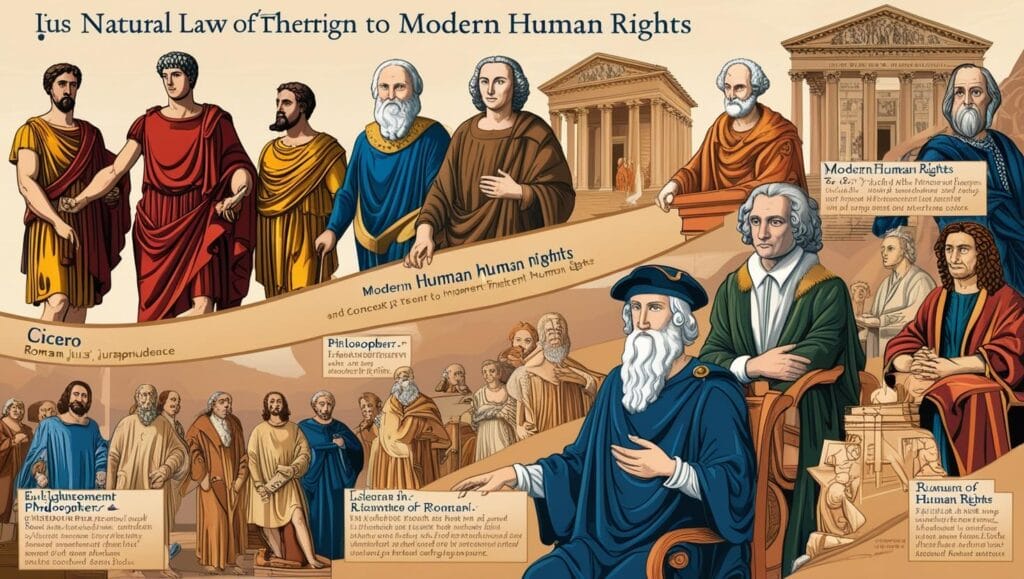
FAQ on Natural Law and Human Rights
- What is natural law?
- Natural law refers to a set of inherent rights and moral principles believed to be universally applicable to all humans, independent of human-made laws. This concept is rooted in the belief of a higher moral order, as reflected in the U.S. Constitution.
- How did Roman law contribute to modern human rights?
- Roman law laid foundational principles that influence contemporary legal systems. Its concepts, such as due process and the presumption of innocence, have been referenced by U.S. courts and underscore many human rights frameworks today.
- Are natural rights the same as human rights?
- Natural rights are a philosophical concept suggesting inherent human rights, while human rights are formalized in legal documents and treaties. Natural rights often inform the development and interpretation of human rights.
- What are some common misconceptions about natural law?
- A common misconception is that natural law is purely religious or subjective; however, it is a secular concept emphasizing universal moral standards that transcend specific legal systems.

